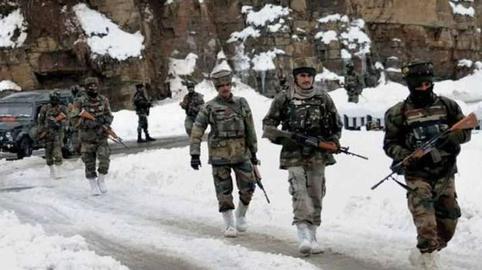Emil Filtenborg and Stefan Weichert are independent journalists based in Ukraine. In a weekly series for IranWire, they examine the landscape of disinformation in Russia and some of the false information that has emanated from the country since the outbreak of coronavirus.
Disinformation has targeted countries in the European Union, amongst others, as Russia focuses on the upcoming constitutional vote and the famous Victory Parade. According to one expert, though, Russia is also trying to take a stand against both China and the West.
Russia is going to the polls on Wednesday, July 1 to decide whether Vladimir Putin can run for President again in 2024. The vote will draw much media attention inside the country. Despite this, Russia’s state-controlled media outlets are still trying to influence public opinion abroad in neighboring states, shows analysis from the fact-checking site EUvsDisinfo, an initiative of the European Union.
The International Monetary Fund (IMF) recently provided a five-billion-dollar loan to Ukraine, and some Russian outlets have portrayed it as proof of how the West is trying to turn Ukrainians into a “cheap labor force”. While many Ukrainians work abroad in the EU to make a living, the IMF loan aims to stabilize the country during Covid-19 and reform the country, and is not about Ukrainian migrant workers.
Elsewhere, some Russian media tried to paint a picture of how the West is exploiting Eastern Europe in general, EUvsDisinfo found. The Russian state-owned Sputnik Poland ran a story about the West trying to turn Eastern Europe into a territory of plunder and devastation, which is labeled as a conspiracy theory by the fact-checking site.
Similar narratives have repeatedly come out of RT Russia and Sputnik Poland, with the apparent intention of sowing division within the European Union. Other stories claim that the US is conducting dangerous experiments in Ukrainian biolabs which it does not dare conduct at home. EUvsDisinfo points out that those laboratories do, in fact, exist – but they are focused on making vaccines.
Picture Putin as a Strong Leader
While Russian disinformation has targeted the EU repeatedly in the past week, however, these narratives are not the dominant ones inside Russia – where everything is currently about the upcoming constitutional vote, reminding Russians of Putin's accomplishments and how Russia needs a strong leader like him in charge.
"The focus is on the vote and the upcoming World War Two Victory parade that Putin is determined to have," explains Mark Galeotti, an honorary professor at University College London's School of Slavonic and East European Studies, who has studied Russian history and security issues since the 1980s.
"For the Kremlin, it is two parts of the same thing, and we see a clear push to have the vote now and secure a good, solid pro-vote because it does not look like things are getting any better in Russia in the next two months and trust in Putin is declining. The parade is a way to stimulate patriotic voices, to get people fired up before the vote, and make Putin appear a strong man.”
The independent polling agency Lavada found Putin's approval rating had dropped to 59 percent in May, the lowest on record since November 2013, and the same poll found that 33 percent of Russians disapproved of Putin's actions during the Covid-19 lockdown.
"Russian media is focused on everything other than what is important: the question of whether Putin should be able to run for President after 2024,” says Galeotti. “Instead, the media focuses on pensions and minimum wage in the country.”
The issue of Covid-19, with the numbers of infected in Russia remaining high and more than 560.000 reported cases, is still being covered, but they have become secondary to the Kremlin's aim of securing a good result in the constitutional vote. According to a new study conducted by one of the leading universities in Russia – the Higher School of Economics - 23.2 percent of Russians see Covid-19 as a fiction.
"We do see examples of how the media is saying that you are lucky that you are in Russia because it is terrible in the US and the UK,” says Galeotti. “We still see that, but the coverage is relatively balanced, and it is not a serious political topic in Russia.”
Galeotti adds that with some irony, state-owned Russian media outlets are mostly trying to make people take the pandemic seriously – the exact opposite of their apparent intentions abroad.
"Spies" are Arrested
On top of the constitutional vote, the sentencing of the American citizen Paul N. Whelan in Russia attracted much attention this week. Whelan is facing a 16-year jail term for espionage, which he denies. Western outlets have speculated whether Russia sentenced him solely to bring about a future prisoner swap with the US.
This week, Russia also arrested one of its leading researchers in the Arctic, Valery Mitko, for treason, because authorities believe he has been spying for China. It is worth noting, says Galeotti, because it shows that Russia is taking a stand against China to some extent, and it is portrayed in this manner in the media.
"It is playing into the narrative that the whole world is against us," Galeotti says. "It shows us that Russia is increasingly worried about China and its role and don't want to risk being squeezed in between [the West and China], and being forced to choose sides.”
Also in this series:
Missing Data, Mud-Slinging and “Miracle Cures”: Why Disinformation Is Bad For Your Health
Iranian Online Network Still Peddling Coronavirus Disinformation
Putin’s Domestic Problems Eclipse Russian Disinformation Campaigns
China's Campaign to Protect President Xi against Coronavirus Criticism
Chinese Embassies Work Overtime to Diffuse International Fury Over Coronavirus
Russia Bans Coronavirus "Fake News" and Slams US Over Press Freedom
China Blocks Investigations Amid Refusal to Shut Down Wet Markets
From Coronavirus to the Second World War: On the Frontlines of the Russian Disinformation Battle
Russia Blames West for Propaganda While Reporting Unlikely Number of Covid-19 Deaths
As Criticism of China Falters, Time for a NATO for Human Rights?
Guest Post From Russia: How do You Put the Brakes on a Fake News Machine?
Has China Really Given Assent to a Global Coronavirus Review?
Russian Disinformation Back to Targeting Ukraine as Putin Declares Covid-19 Peak has Passed
Will the Post-Coronavirus World Stand Up to China's Bullying Business Tactics?
Coronavirus: An Opportunity to Advance Russian Interests in Latin America
The Shi Zhengli Identification Criteria: How Do We Know Where Coronavirus First Emerged?
Covid-19 and Black Lives Matter Unrest Targeted by Russian Disinformation
Occupy First, Talk Later: China Turns Border Conflict Into PR Opportunity
visit the accountability section
In this section of Iran Wire, you can contact the officials and launch your campaign for various problems


























comments